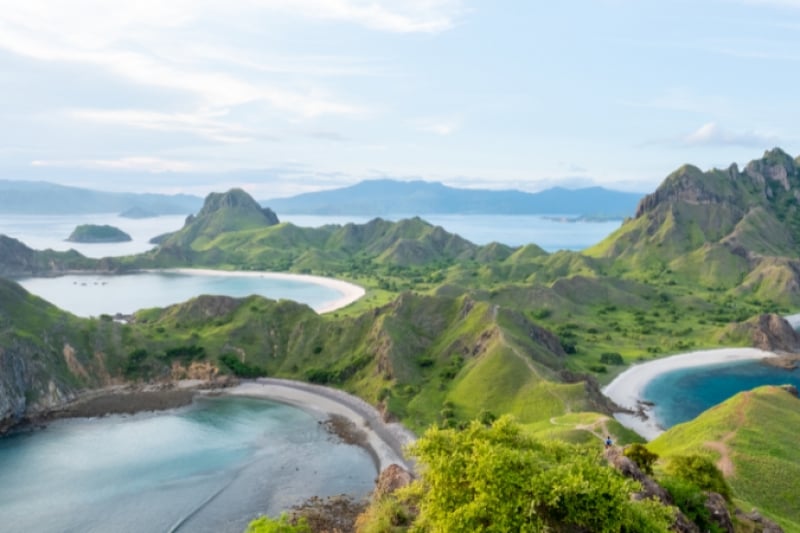Travel is one of life’s greatest joys, offering opportunities to discover new cultures, immerse yourself in nature, and gain fresh perspectives. However, it can also result in significant environmental and social impacts. Sustainable travel, often referred to by terms like eco-tourism, green travel and responsible tourism focuses on making conscious choices that minimise your environmental impact while maximising benefits to local communities and ecosystems.
By planning your trips with care, you not only help protect the planet but also preserve the beauty and diversity of destinations for future generations. The best part? Travelling sustainably doesn’t have to be expensive. With smart planning and mindful decisions, you can reduce costs while creating richer, more meaningful travel experiences. Sustainable travel allows you to embrace thoughtful choices which not only create meaningful and unique experiences but can also help you save money along the way.
1. Choosing a destination and time to travel
Prioritise eco-friendly destinations
Image credit: LeoPatrizi via Canva Pro
Seek out destinations that allow you to prioritise sustainability, such as those with efficient public transport systems and strong eco-tourism practices. For instance, cities like Copenhagen and Amsterdam, are known for their reliable public transport and extensive cycling infrastructure. Visitors can easily explore the city using eco-friendly options like buses, metro lines, or bicycles. Opting for destinations with efficient transport systems reduces your reliance on cars, helping lower your carbon footprint while supporting the local communities such as bike tours and rental shops.
To complement your sustainable travel choices, go cashless with the DBS Travel Wallet. Whether you’re paying for bike rentals or enjoying local eco-friendly experiences, the DBS Visa Debit Card linked to your multi-currency account allows you to spend seamlessly in 11 currencies. With up to 5% cashback on overseas spending, instant currency exchange at competitive FX rates on the DBS digibank app, you can explore sustainably while ensuring convenience and great value.
Travel during off-peak seasons

Image credit: Sanga Park via Canva Pro
Visiting popular spots during off-peak seasons offers multiple benefits beyond just saving money on flights, accommodations, and attractions. It helps reduce the strain on local resources such as transportation systems, which are often overburdened during peak travel periods. For example, visiting Kyoto during early spring instead of peak cherry blossom season allows you to enjoy the serene beauty of the city without the overwhelming crowds. You’ll have a more immersive experience in iconic spots like the Kiyomizu-dera Temple with fewer tourists jostling for space.
Seek out lesser-known gems

Image credit: sutiwat jutiamornloes via Canva Pro
Instead of popular hotspots, you can also consider lesser-known locations and destination dupes that offer similar experiences without overwhelming crowds and inflated prices. This approach helps reduce the strain on overburdened tourist hubs while opening the door to unique, more authentic and affordable adventures. For instance, skip the overcrowded beaches of Bali and explore nearby islands like Nusa Penida or Flores. These destinations retain the charm of Indonesia’s tropical allure while offering quieter, crowd-free experiences. By stepping off the beaten path, you’ll enjoy hidden treasures while actively supporting communities that benefit from a more balanced flow of visitors.
2. Budgeting & planning for sustainable travel
Look out for eco-certifications
When selecting accommodation for your sustainable trip, it’s important to prioritise options that minimise their environmental impact. One of the best ways to do this is by looking for eco-certified establishments. For instance, eco-friendly hotels might implement energy-saving measures like solar panels or energy-efficient lighting, use water-saving fixtures, and follow waste management practices such as recycling or composting.

Image credit: Morsa Images via Canva Pro
Apart from established eco-certified hotels, you can also consider more budget-friendly alternatives like hostels or homestays, which may not always have formal certifications but still practice sustainable habits. Listings on platforms like Airbnb often detail how they incorporate sustainable practices, some may focus on water and energy conservation, provide locally sourced food, or even offer cultural activities that support the local community.
To find these eco-friendly options and compare prices efficiently, consider using travel aggregators like the DBS Travel Marketplace. These platforms help you find the best deals on accommodations that suit your sustainable travel goals, giving you a wide range of choices from budget-friendly stays to more luxurious hotels, all in one place.
Pack Light

Image credit: Vlada Karpovich via Canva Pro
Just like regular travel, setting a realistic budget is key to making sustainable travel work. Be sure to account for all the essential components of your trip, including flights, accommodations, food, activities, and transportation. Planning your expenses upfront helps ensure that you can enjoy a well-rounded experience without overspending.
One often overlooked aspect of planning is the weight of your luggage. Packing light not only makes your trip more convenient but also helps reduce the environmental impact associated with transporting excess weight. It can also bring a host of practical benefits such as saving you the often hefty baggage fees that many airlines impose, especially for checked luggage.
Adopt Slow Travel

Image credit: VogelSP via Canva Pro
Slow travel focuses on immersing yourself in a destination rather than rushing through multiple locations. This approach not only allows you to save money but also reduces your carbon footprint, as slower modes of travel like trains emit significantly fewer greenhouse gases compared to flights. For instance, when exploring Europe, consider train journeys such as the iconic Glacier Express in Switzerland which offers a scenic journey from Zermatt to St. Moritz, winding through the Swiss Alps and providing passengers with stunning views that you simply cannot experience from the air. Train rides like these allow you to enjoy the journey itself, rather than just rushing to the next location. To make slow travel more affordable, one of the best strategies is to plan ahead and take advantage of rail passes.
3. Planning your activities
Walkable itineraries

Image credit: galitskaya via Canva Pro
Where possible, planning your activities close to one another allows you to walk between destinations, reducing the need for taxis, buses, or other forms of transport. Walking through a city offers opportunities to discover hidden spots that you might not encounter when travelling by car or public transport. For example, when visiting places like Penang and Tokyo, walking between attractions gives you the chance to notice small details, like murals on alley walls, local cafés, and unique shops.
Embrace Free or Low-Cost Activities

Image credit: kamponwarit via Canva Pro
Some of the best travel experiences are the ones that don’t cost much, but still offer a deep connection to the place you’re visiting. Activities like hiking, visiting public parks, or relaxing by the beach are not only cost-effective but also allow you to immerse yourself in the country’s natural landscape for a richer cultural experience.
Similarly, visiting public museums and local markets can provide a window into the culture and heritage of the community. Visiting a public museum offers a chance to learn about the region’s history and traditions while shopping at local markets helps support small vendors and artisans.
Dine Locally

Image credit: Gpoint Studio via Canva Pro
Eating at locally owned restaurants or trying street food supports small businesses and reduces the carbon footprint associated with imported goods. For example, in Vietnam, opt for pho at a family-run eatery rather than dining at international chains. By dining locally, you enjoy a more immersive and sustainable culinary experience while keeping your travel budget in check.
4. Choose to go cashless where possible
Opting for cashless payments not only offers convenience but is also a greener choice. The environmental cost of printing, transporting, and handling physical currency adds up, while digital transactions reduce the need for these processes. By choosing to go cashless, you play your part in lowering the carbon footprint associated with currency production.
One practical way to go cashless while travelling is by using the DBS Travel Wallet. Simply link your DBS Visa Debit Card to your multi-currency account (MyAccount or Multiplier Account) as the primary debiting account to access the 11 different currencies with zero foreign exchange conversion fees.
Just remember to keep sufficient foreign currency in the respective currency pockets for your spending amounts to be debited. This allows you to make seamless, eco-friendly payments in different countries without the need for exchanging cash or carrying large sums of money. It’s a sustainable choice that also offers safety, convenience, and competitive exchange rates for your travels.
Choosing this also gives you greater card security, as you can set spending limits and selectively enable card transaction functions while you are overseas, all with a few simple taps on your digibank app.
5. Give back to the community
Shop Ethically

Image credit: IRYNA KURILOVYCH via Canva Pro
Buying handmade souvenirs directly from local artisans, rather than opting for mass-produced goods ensures that your money goes back into the community. For example, in Peru, purchasing alpaca wool scarves from indigenous weavers helps support traditional craftsmanship and sustains local economies. These unique, often ethically sourced items also make for meaningful mementoes of your trip.
Hire Local Guides

Image credit: Oliver Wu via Canva Pro
Instead of booking commercial tours, opt for small, locally run operators that offer city or hiking tours. In Taiwan, for example, you can explore the island’s natural beauty through guided hikes in Taroko Gorge or take a walking tour of Taipei’s vibrant night markets. These local tours provide more personalised and authentic experiences, allowing you to immerse yourself in the culture and landscape. By choosing these tours, you support local guides and small businesses, directly contributing to the local economy and fostering sustainable tourism practices.
Support local initiatives and charities

Image credit: SL_Photography via Canva Pro
Look for ways to contribute to community-driven projects or local charities, such as environmental preservation efforts or social initiatives. For example, in places like Costa Rica, you can support animal and sea turtle conservation programs by participating as a volunteer or donating to local nature reserves. Not only do these initiatives allow you to make a positive impact during your travels, but also experience the country and culture in a truly personal and unforgettable manner as you interact with the locals. This ensures that your visit leaves a lasting benefit for the people and places you encounter.
6. Reduce waste and go green
Pack reusables

Image credit: Neustockimages via Canva Pro
Carry reusable water bottles, utensils, and shopping bags to minimise single-use plastics during your trip. Many countries now have refill stations or filtered water sources. For example, Japan has numerous stations for refilling water bottles, making it easy to reduce plastic waste. The MYMIZU app is a great tool for finding these water stations and supporting a sustainable, waste-free trip.
Embrace digital tickets and paperless travel

Image credit: Sitthiphong via Canva Pro
Whenever possible, opt for digital tickets and paperless travel options to reduce paper waste. Many transport systems and attractions now offer mobile or electronic tickets, eliminating the need for printed passes. Attractions in cities like Singapore or Barcelona allow visitors to store their tickets on smartphones, which helps reduce the use of paper and the environmental impact associated with physical tickets. When doing this, remember to make sure these documents are made available offline so that you can still access them in the event your phone loses connectivity.
7. Safeguard your trip with insurance
Sustainable travel often includes outdoor activities or visits to remote locations, which can come with their own set of risks. Comprehensive travel insurance, such as TravellerShield Plus provides essential protection against unexpected events like trip cancellations, lost baggage, or medical emergencies. With the peace of mind that your journey is covered, you can fully embrace your eco-friendly adventures and enjoy a stress-free experience for both you and your family.
The overlap between smart budgeting and sustainability is a powerful reminder that we can travel in a way that enriches both our lives and the planet. Ultimately, if we don’t take care of the world today, future generations may find fewer destinations to explore — so it’s essential to travel with purpose and leave a positive legacy for those who come after us.
Brought to you by DBS
This post was originally published on here







